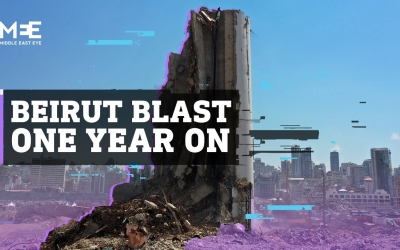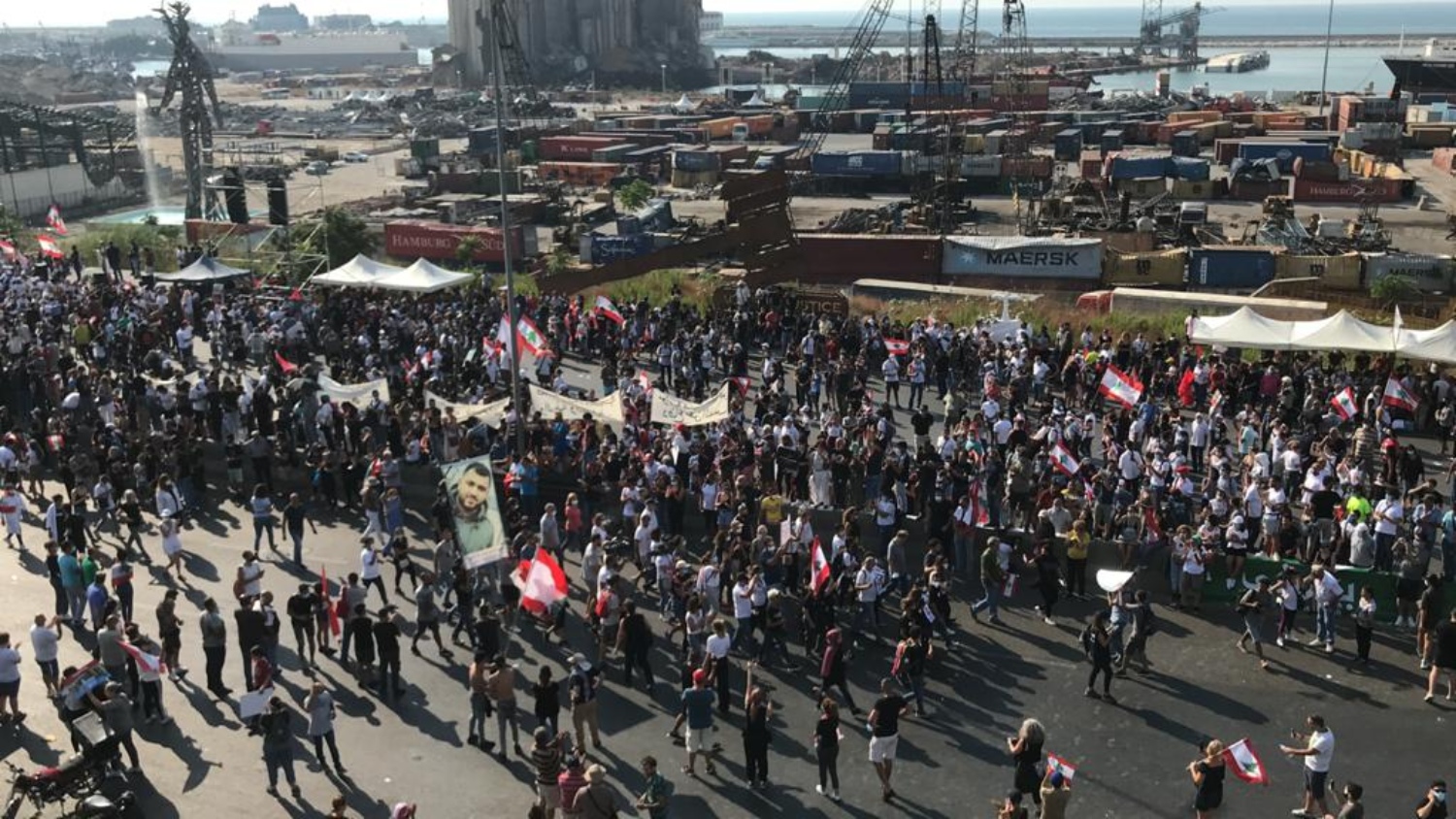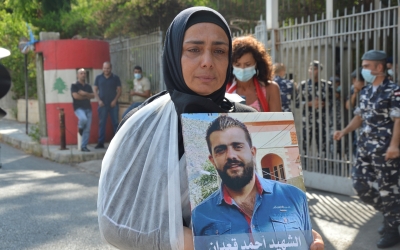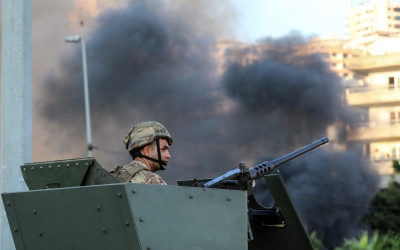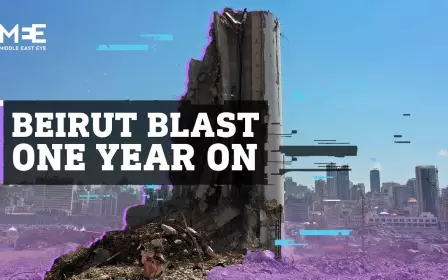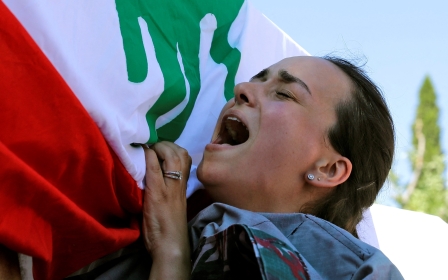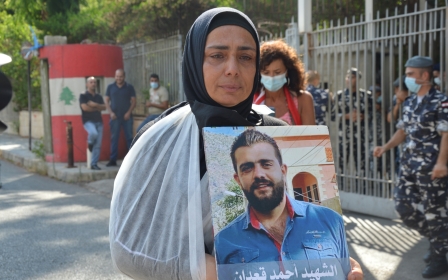Beirut explosion anniversary: Protesters march across Lebanon's capital in remembrance
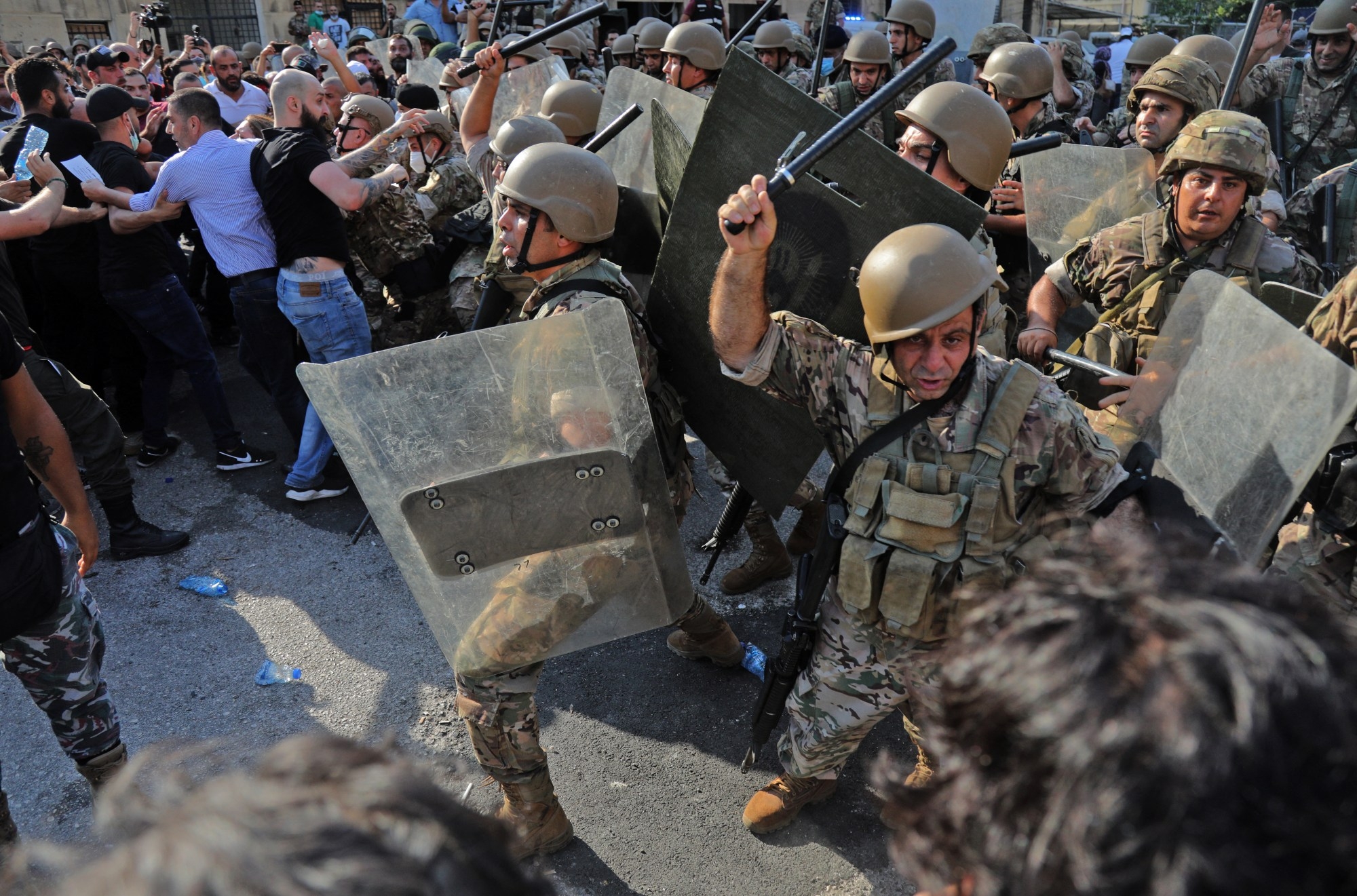
Lebanon was engulfed in a charged atmosphere of grief and anger on Wednesday, a year after a devastating explosion in Beirut’s port that killed more than 200 people and devastated entire neighbourhoods of the Lebanese capital.
A number of marches - led by relatives of victims, opposition groups tied to the October 2019 protest movement, the Lebanese army and some political parties - started taking place across Beirut from 12pm (9am GMT) into the evening.
New MEE newsletter: Jerusalem Dispatch
Sign up to get the latest insights and analysis on Israel-Palestine, alongside Turkey Unpacked and other MEE newsletters
Several such demonstrations went through the hard-hit neighbourhoods of Mar Mikhael and Gemmayzeh and the port, before thousands of protesters headed towards the parliament, located in downtown Beirut.
A minute of silence was held at the port at 6:07pm (3:07pm GMT), the exact time when the explosion ripped through the city, before a woman sung the national anthem.
Lebanese security forces used large quantities of tear gas, water cannons and batons against demonstrators near the parliament on Wednesday evening, as angry protesters lit fires and threw stones in the general direction of the government building, as some tried to break through barricades.
A small group of protesters was also seen throwing rocks at the windows of the Economy Ministry, located in the same neighbourhood.
The Lebanese Red Cross reported that more than 50 people were injured in the protests, including six who were sent to hospitals for treatment.
Lebanese forces had already closed down a number of roads in and around downtown on Wednesday morning ahead of the protests, as tens of thousands took to the streets in the afternoon to mourn the lives lost and call for justice.
“We first want justice for the victims. We want answers, we want to know who was responsible for allowing the ammonium nitrate into the country, who stored it, who it was for, and who ignited it,” Kayan Tlais, a spokesperson for a committee of the families of the victims, told Middle East Eye ahead of the marches.
Tlais lost his 39-year-old brother Mohammad, a foreman at the port’s container terminal, on 4 August.
“Today I am taken one year back, to the moment when I was looking for my brother. The wounds have reopened,” Tlais said. “For us to find some peace, we want every person who is responsible for this crime to be held accountable.”
He meanwhile warned against “the exploitation of our martyrs and our victims for their own political and personal interests”.
'They sent them to their deaths'
Thousands of demonstrators participated in one of Wednesday's marches in memory of the ten firefighters who were killed in the explosion.
The first responders died while trying to extinguish a fire in the port that led to the blast, without having any prior knowledge that dangerous explosive material was being stored there.
Protesters gathered outside the fire station where the firefighters had worked, waving Lebanese flags, holding photographs of victims of the explosion and clapping as a fire truck passed through the crowd, as they headed towards the port.
"They sent our firefighters to their deaths," one protester shouted through a loudspeaker. "We want all of them prosecuted."
"Down with the government of thugs," the crowd chanted.
“I chose to march for the fire brigades because it’s the most significant for me," Alex, one of the demonstrators, told MEE. "Firefighters were the first ones who went to help, and they lost their lives.”
Another demonstrator, who declined to be named, told MEE that he has lost friends in the explosion.
"We are not just here for their sakes, but for the sake of Lebanon," he said.
A mass led by Cardinal Bechara Boutros Rai, the Lebanese patriarch of the Maronite Church, was being held in the port on Wednesday evening in memory of the victims - only a few hundred metres away from the violent repression of protests in downtown Beirut.
A year without answers
On 4 August 2020, hundreds of tonnes of ammonium nitrate - a chemical compound used both in fertilisers or in bombs - which had been unsafely stored for years in the heart of the city, caught fire, leading to one of the biggest non-nuclear explosions in history.
The blast killed at least 214 people - some of whom are still not officially accounted for in government tallies, while some counts estimate the toll to be as high as 251 - injured some 6,500 and left 300,000 homeless, as tens of thousands of homes were severely damaged.
One year on, full light has yet to be shed on the circumstances that led to the explosion and which officials were aware of the risk ahead of time.
A national investigation has yet to make much progress, as MPs have stalled to vote on the investigating judge’s request to lift immunity from prosecution for political figures and high-level security officials suspected in the case.
Meanwhile, families of the victims have taken to the streets every month to pay tribute to their loved ones and demonstrated outside ministries to demand justice - despite being faced with violent repression by Lebanese forces.
Lebanon’s political class - long accused of corruption and impunity since the country’s 15-year civil war - has been held responsible for the explosion by large swathes of the Lebanese public, who see the lack of political will to move the investigation forward as further proof of guilt.
Some have argued that justice cannot be achieved so long as the investigation into the explosion is at the mercy of Lebanon’s ruling class, calling for an independent international inquiry. On Tuesday, Human Rights Watch released a report of its own investigation to uncover which senior officials were aware of the dangers presented by the 2,700 tonnes of ammonium nitrate stored in the port since 2013 - including President Michel Aoun and former Prime Minister Hasan Diab.
“The evidence overwhelmingly shows that the August 2020 explosion in Beirut’s port was caused by the actions and omissions of senior Lebanese officials who failed to accurately communicate the dangers posed by the ammonium nitrate, knowingly stored the material in unsafe conditions, and failed to protect the public,” Lama Fakih, crisis and conflict director at Human Rights Watch, wrote.
“A year later, the scars of that devastating day remain etched in the city while survivors and families of the victims await answers.”
'No blank cheque' for Lebanon's elite
Before the explosion Lebanon had already been suffering from a crippling economic crisis, which has since worsened to become one of “most severe” in the world since the mid-19th century. Long fuel lines and shortages of basic medicines now mark daily life in the country, while the Covid-19 pandemic has stifled the uprising that began in late 2019 against the country’s longstanding elite.
At a UN-backed donor conference on Wednesday, French President Emmanuel Macron, who aims to raise at least $350m in emergency aid for Lebanon, said that Lebanese leaders "owe their people the truth and transparency" regarding the circumstances surrounding the blast.
"Lebanese leaders seem to bet on a stalling strategy, which I regret and I think is a historic and moral failure," Macron said in his opening remarks as host of the international donors' conference. "There will be no blank cheque for the Lebanese political system. Because it is they who, since the start of the crisis, but also before that, are failing."
Berlin also had harsh words for Lebanon’s political elite.
"Let me be frank: this crisis is mostly man-made. Lebanese political actors have not lived up to their responsibilities and to the legitimate expectations of the Lebanese people," German Foreign Minister Heiko Maas told the conference.
The international community is refusing to sign off on a bigger rescue plan until Lebanon has a new government that is committed to tackling corruption and undertaking economic reforms.
Attending Wednesday's video conference, Aoun appealed for international solidarity, while calling for “justice to be met” for victims of the blast.
"Lebanon is currently going through the hardest times," Aoun said. "Lebanon is counting on you, don’t let it down!”
Aoun pointed to ongoing government formation efforts as a sign, he claimed, that the country was on track to implement long-awaited reforms.
Lebanon has been without a government for all of the past year, after Diab resigned as premier in the wake of the explosion.
Former prime minister-designate Saad al-Hariri abandoned his effort to form a new government in July, after nearly 10 months of failing to agree on its makeup with Aoun.
Najib Mikati, a wealthy businessman who has been prime minister twice before, became the new designated premier on 26 July. While Mikati had hoped to form a cabinet by the anniversary of the blast, squabbling over cabinet posts continues.
Critics inside Lebanon have argued, however, that no substantial changes in governance can truly take place so long as the same political figures continue to hold on to power.
This article is available in French on Middle East Eye French edition.
Middle East Eye delivers independent and unrivalled coverage and analysis of the Middle East, North Africa and beyond. To learn more about republishing this content and the associated fees, please fill out this form. More about MEE can be found here.


